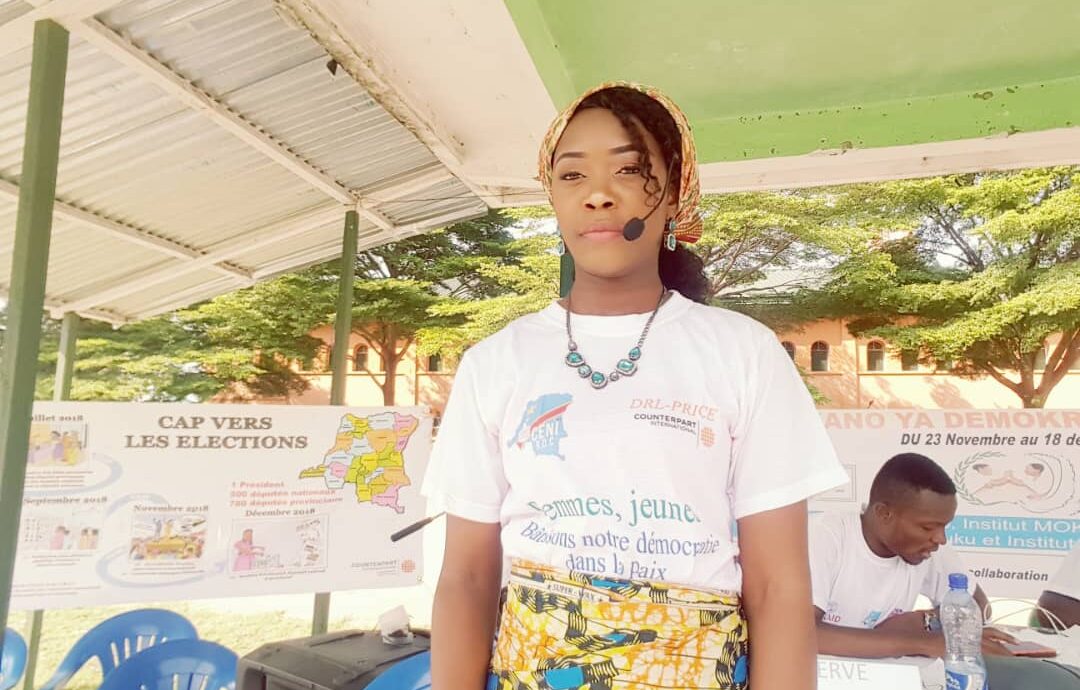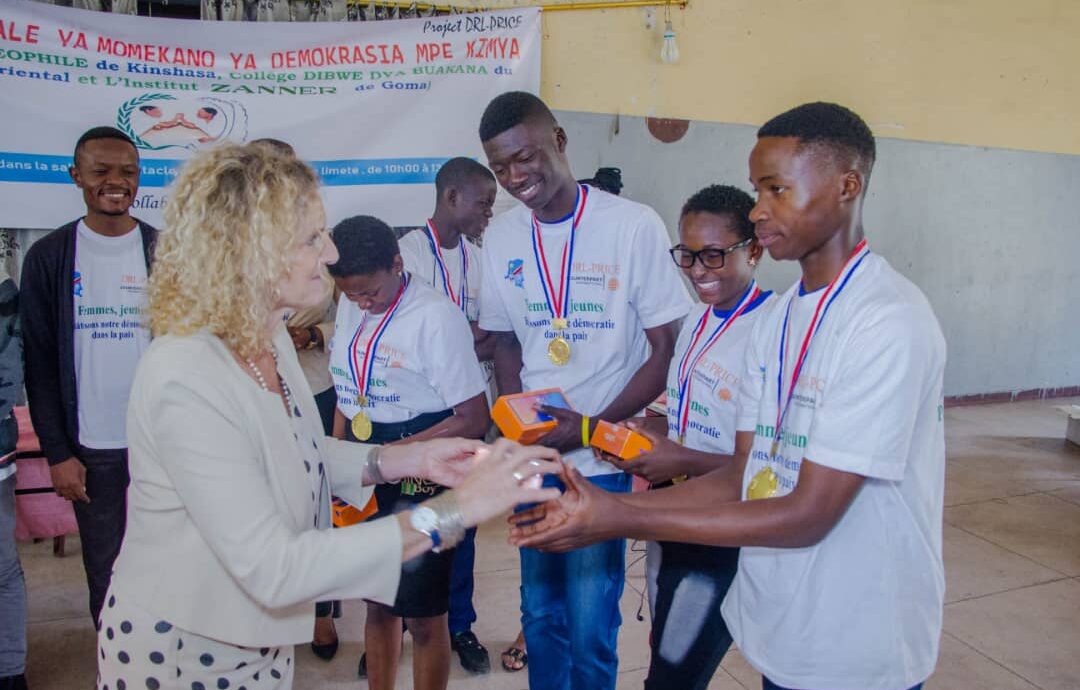In 2006 the Democratic Republic of Congo (DRC) jumped on the decentralization bandwagon, hoping –like other developing countries — to mitigate fragility and improve accountable service delivery. However, researchers and practitioners cautioned that decentralization success would depend on numerous factors, principally, robust civic engagement and trust in political institutions. Fortunately, the announcement of elections to determine a successor to President Joseph Kabila created an opening for strengthening civic participation in the DRC.
Against this backdrop, the U.S. Department of State’s Bureau of Democracy, Human Rights and Labor (DRL) awarded Counterpart International Promoting Increased Civic Engagement in the Lead-up to Elections in the Democratic Republic of Congo (PRICE). The approximately $2.5M program, implemented from June 2016-December 2019, was initially intended to provide civic and voter education and increase civic participation among historically under-represented groups. However, as elections were repeatedly postponed, the program expanded to focus on increasing citizen’s commitment to conducting conflict-free elections and supporting peacebuilding and mediation efforts in pursuit of a peaceful transition of power.
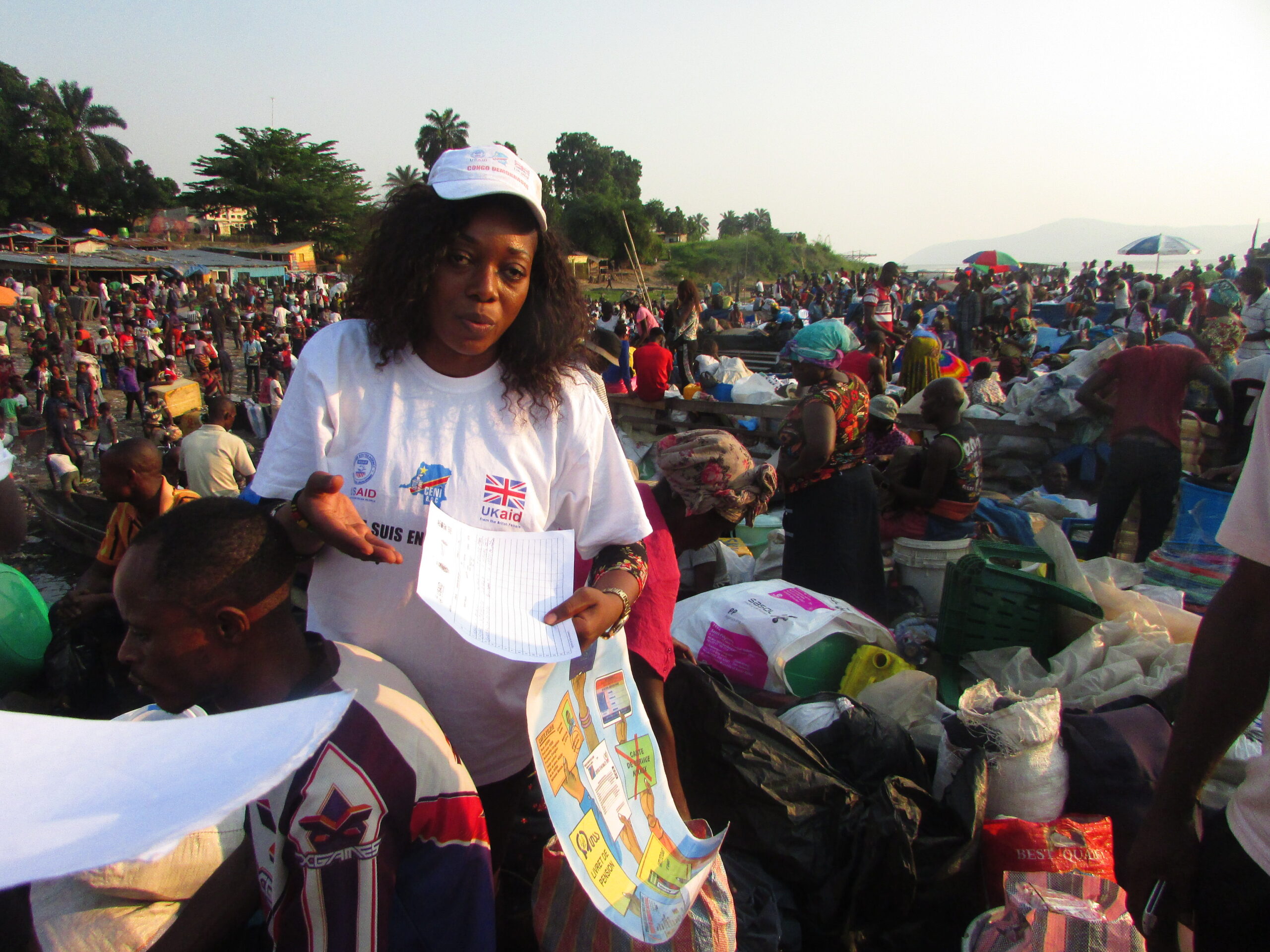
For many Congolese, these activities afforded the first meaningful opportunity for community stakeholders to interface with their government counterparts. Reflecting on the program, there are five successful engagement tactics from the national elections which could be applied towards eventual local elections and other governance strengthening initiatives.
First, we started with trust building. Counterpart and our partners organized multi-stakeholder community dialogues with animateurs who presented images to initiate conversations about community concerns and priorities. Sharing images was a strategic approach used to open a dialogue on civic engagement among illiterate populations. The process also enabled stakeholders to feel heard, providing a sense of validation and cultivating a sense of empathy toward stakeholders with shared values for a peaceful and stable future for their communities. According to Simon Idi, a Program Manager with one of our partner organizations that led activities in the Kivu provinces, when PRICE animateurs entered conflict zones, “Populations in these areas had a lot of anxiety vis-à-vis the electoral process and vis-à-vis the authorities. We brought them together for discussion and dialogue which enabled them to build mutual trust, in each other and in the electoral process.”
This approach was later adapted for civic education and peacebuilding purposes. Depending on specific community needs, the animateurs informed citizens on voter registration, the voting system, peaceful participation, electoral dispute adjudication, decentralization, and participatory governance. In total, this activity reached 1,153,236 Congolese citizens, of which 55% were women and 78% were youth. Some educators appreciated this pedagogical approach so much, they applied it in their classrooms.
Next, we amplified community voices – particularly those of marginalized actors. We did this through two mechanisms: citizen forums and radio talk shows. Citizen forums engaged historically under-represented citizen groups – including women, youth, indigenous populations (e.g. Pygmy communities), albinos, and persons with disabilities. Citizen forums created important channels for sharing information with election officials to keep citizens informed and interested in on-going developments like updates to voter rolls, new registration processes, and other innovative efforts to increase citizen participation. In one visit to the Batwa Pygmy communities, participants revealed that no one had ever explained the importance of choosing a leader by voting and were looking forward to registering and exercising their right to vote.
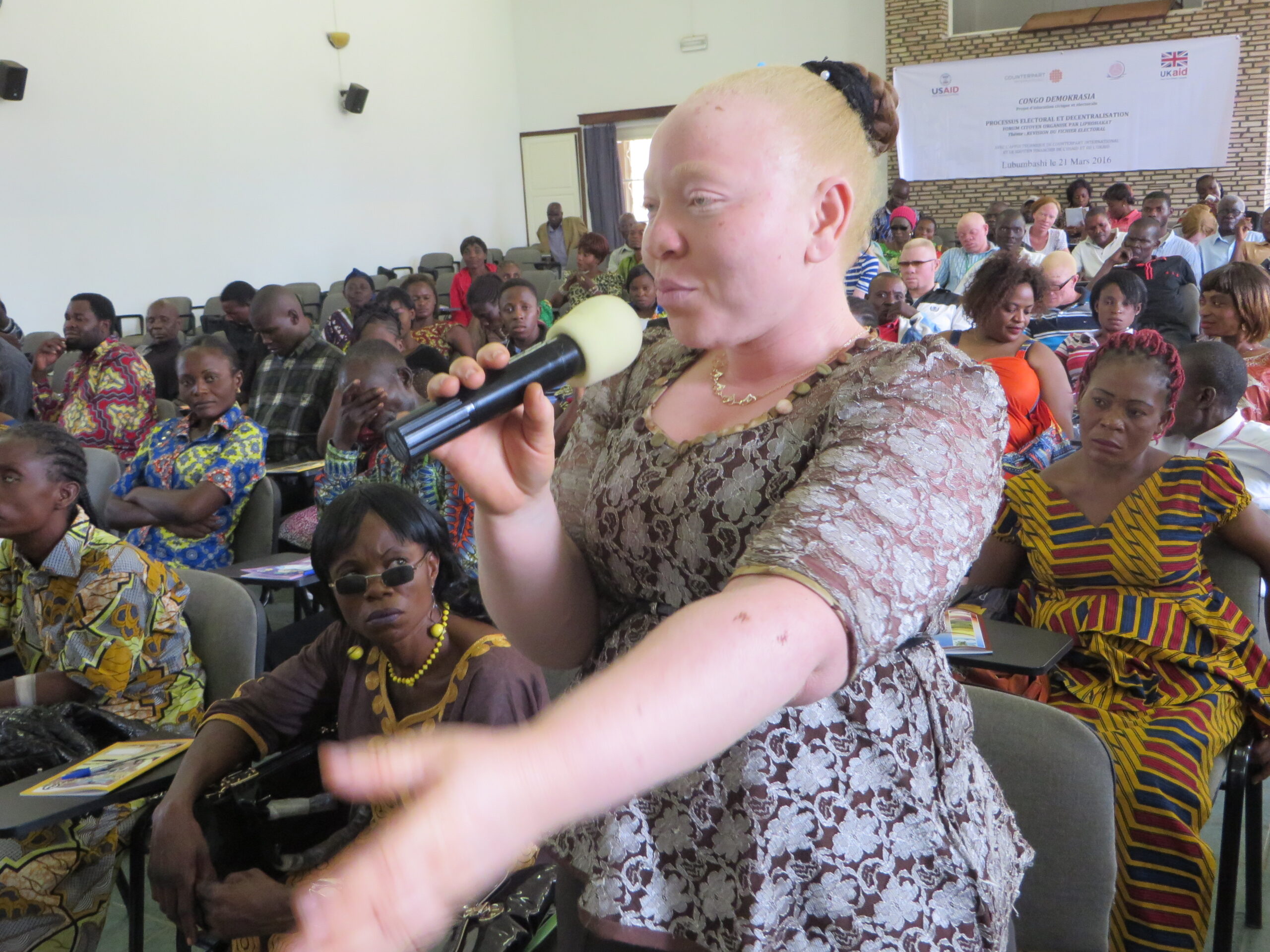
Radio talk shows like Bilenge mpe Demokrasia (Youth and Democracy), which originally aired on local radio station Top Congo, further mobilized communities to share their experiences, and were so popular that they were later expanded to other community stations across the country, leveraging partner Fondation Hirondelle’s community radio network of over 70 members. The discussions included participants of the ruling and opposition parties, academic experts, civil society leaders, members of parliament elections officials, police, and artists. Listeners could participate to the conversation by texting in their comments, but the program received such overwhelming responses, the radio stations eventually had to open up their call lines.
Third, we increased meaningful youth engagement. In 2017, we organized Momekano ya Demokrasia mpe Kimia (Young Democrats Contest) – a competition for youth to test their understanding of democracy in the DRC. Developed along the lines of the French gameshow “Questions for a Champion”, the competition allowed each contestant to choose and answer a question in front of an audience of their peers. Questions ranged from the purpose of democratic elections to the identification of public goods, and the way young citizens can protect those goods dedicated to common use. Peer judges selected winners who received computers and printers for their school through generous donations provided by the Open Society Institute for Southern Africa (OSISA). As one judge observed, the competition was transformational. Maître Mpiana Malela, Momekano noted, “The most important thing in Momekano is not the winners. It’s rather what the competitors keep in their mind. The civic culture they are gaining is consequently impacting their behavior.”
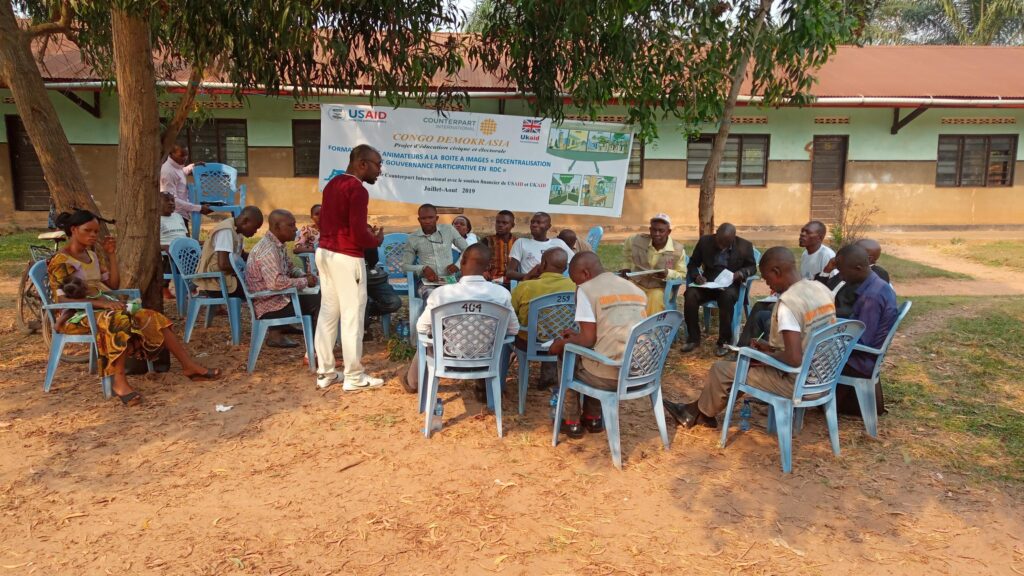
Similarly, youth art competitions like Bilili ya demokrasia mpe kimia (Drawing for Peace) engaged youth to produce artwork, which was exhibited along a busy road in Limete where over 500 passers-by paused to view and converse with the artists. The Bilili contest was a unique opportunity for young artists to discover their capacity to awaken the consciousness of those around them on election issues and, as peacemakers, to pinpoint the importance of peace.
We also maintained constant communication between our community stakeholders and election officials. As the election timelines and procedures rapidly shifted, Counterpart and its local partners facilitated ongoing citizen forums with the Commission Électorale Nationale Indépendante (CENI). These dialogues ensured that election-related policies and other decisions were transparent and publicly available, thereby increasing trust in institutions.
We also provided technical support to establish a Center for Monitoring and Analysis of Electoral Conflicts in Congo (CMACC) along with a call center that could deploy peace mediators in the event of pre or post-electoral violence in coordination with CENI. Further, we supported web integration to improve communication between rapid responders on their smartphones. CMACC’s monitoring systems were further enhanced with ArcGIS software, enabling an illustration of the early warning alerts sent from various communities. Counterpart also collaborated with Freedom House to centralize data collection for Carter Center observers and CMACC mediators, and to consolidate them under the Carter Center’s NEMO[1] platform. Operational during the election, CMACC observed over a hundred conflicts and proved to be an effective tool to prevent and manage pre- and post-electoral conflicts
Finally, our community engagement and messaging efforts went to the street. To engage a broader cross-section of society we initiated activities at the grassroots levels seeking out vulnerable groups in their working place. We engaged women stone crushers, fisherman, and taxi-moto drivers, among others. Skits like Tolobela Demokrasia mpe Kimia (Let’s Talk Democracy and Peace) were organized outdoors, led by a local theater group, addressing a topic related to elections, democracy, or peace. A question-answer period allowed audience members to exchange ideas on peace and democracy and win a t-shirt bearing peace messages. Peace mediators were also deployed at the street level in Kinshasa to share infographics about the importance of peace by going door-to-door, visiting businesses and homes, and strolling in the markets, to speak with retailers.
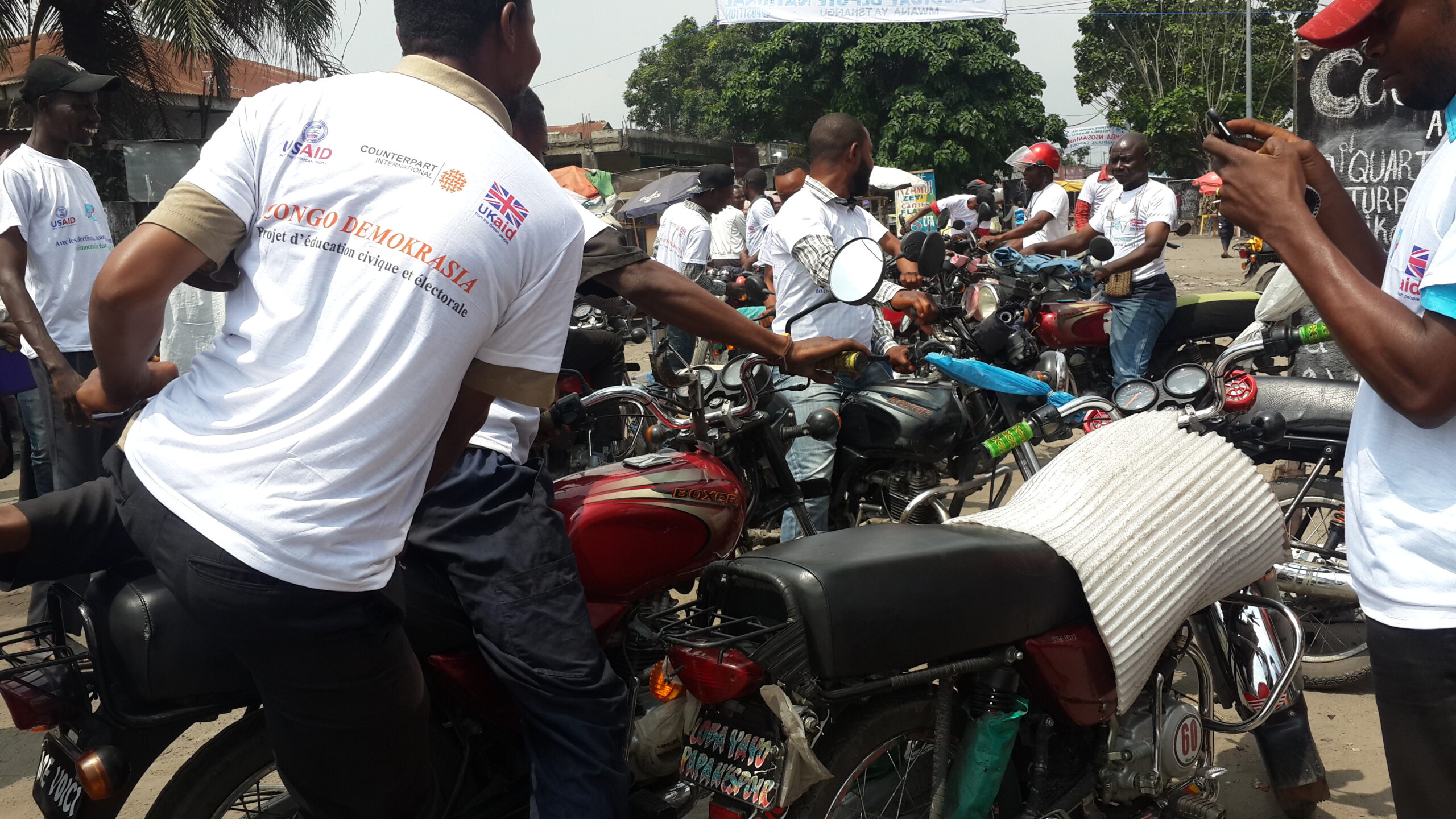
In short, despite significant complexity and political turmoil, through our multi-pronged efforts, Counterpart was able to strengthen civic engagement and participation in the DRC. However, additional work remains ahead to sustain the nascent gains achieved through PRICE. ApplyingPRICE’s lessons learned and working through local actors can help further enhance civic engagement, thereby increasing citizen’s sense of agency, improving their communication and connection with the public sector, and supporting local governance strengthening.
[1] Next Generation Evaluation, Monitoring (NEMO) is the update of ELMO, an open-source Election Monitoring data collection and reporting system developed by The Carter Center.



